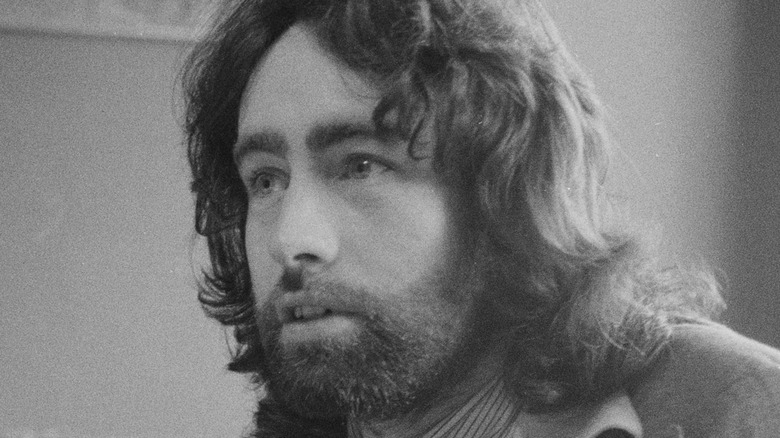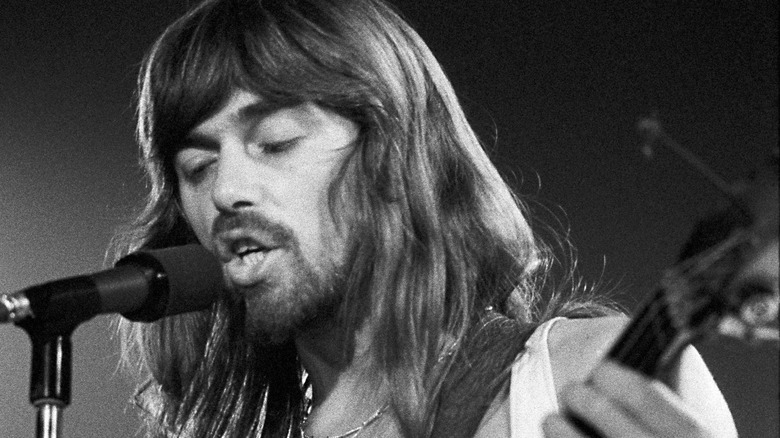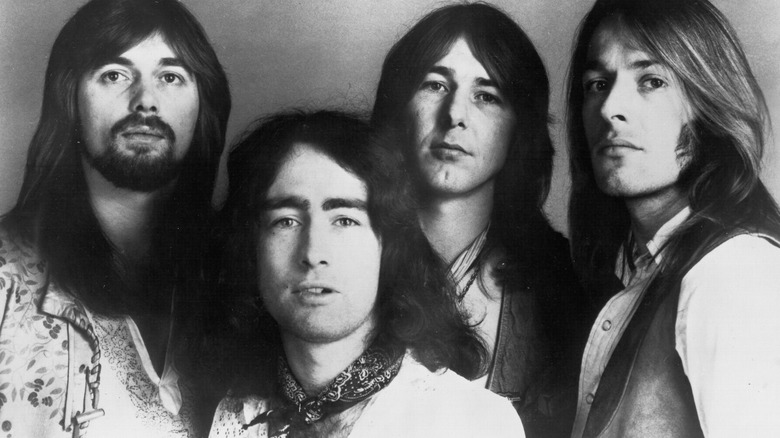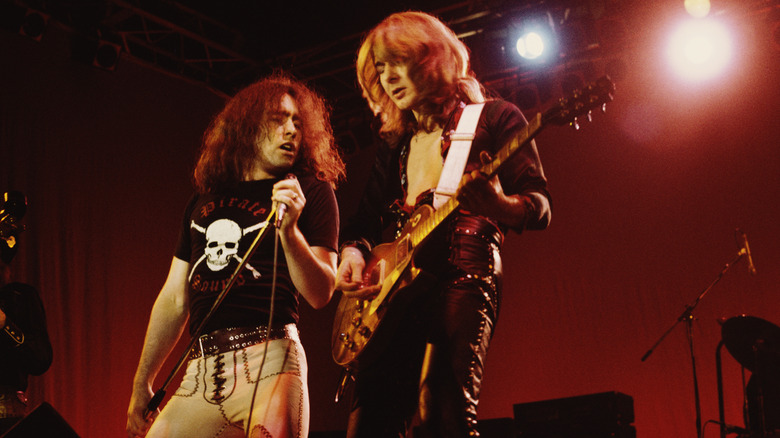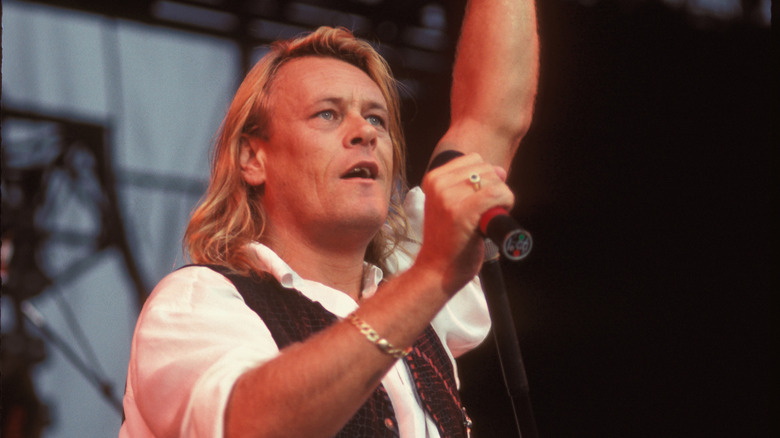The Untold Truth Of Bad Company
In theory, supergroups are supposed to represent the ultimate collection of musical talent all in one band. But with all that talent comes a whole lot of ego, and that's why many of these supergroups only last a few years tops before acrimoniously disbanding — you need look no further than Cream for one such example. Bad Company, however, defied the odds when their original lineup — former Free members Paul Rodgers on vocals and Simon Kirke on drums, ex-Mott the Hoople guitarist Mick Ralphs, and King Crimson alumnus Boz Burrell on bass — lasted nearly a decade together. They also recorded their fair share of classic rock staples during that time, including "Can't Get Enough," "Feel Like Makin' Love," and "Rock 'n' Roll Fantasy." (And we shouldn't forget that rare trifecta — "Bad Company," from the album and the band of the same name.)
As documented for Louder by veteran rock journalist Mick Wall, Bad Company went through many trials and tribulations through the years, including substance abuse, infighting, creative differences, and allegedly troublesome new members who nonetheless tried to keep the band relevant for a new generation of fans. We shall now be looking closer at some of these challenges — as well as a few other interesting facts about the band — as we dive deeper into the untold truth of Bad Company.
Their bassist nearly became the singer of another legendary band
Paul Rodgers was unquestionably the voice of Bad Company's classic lineup. However, they also had another member who was more than capable of holding his own as a lead vocalist, and that was bassist Boz Burrell. And if it wasn't for The Who's decision to rehire Roger Daltrey almost as soon as they fired him, things might have turned out so much differently for both bands in question.
According to Ultimate Classic Rock, Burrell was playing in an R&B band with future Small Faces keyboardist Ian MacLagan when he was announced as The Who's new vocalist in September 1965. At that time, Daltrey had just been fired after he got into a brawl with drummer Keith Moon, and his volcanic temper had long been a concern for his bandmates. However, he was brought back to the band right in time for their next gig and was given an ultimatum — no more violent altercations or you're gone for good.
That might not have been the only time Burrell was announced as Daltrey's replacement, as the still-temperamental singer walked out following a major November 1965 concert and allegedly quit The Who, albeit momentarily. Ultimate Classic Rock wrote that the fallouts from the two incidents might have been conflated with each other, though there is one common thread tying them together — The Who thought highly enough of Burrell to consider him as the replacement for one of rock's legendary voices.
The tragic inspiration behind the song Shooting Star
The song "Shooting Star," from Bad Company's 1975 album "Straight Shooter," remains one of their most recognizable recordings and is arguably among the most heart-wrenching rock songs of the decade. "Shooting Star" was almost like a dark and gritty reboot of the Chuck Berry classic "Johnny B. Goode," with the newer song's Johnny also becoming a rock 'n' roll star but eventually dying from what was implied to be a drug overdose. That particular twist in the final verse likely hit very close to home to many listeners, considering that there were so many rock stars who died young in the late '60s and early '70s.
In a 2020 appearance on "In the Studio with Redbeard" to celebrate the 45th anniversary of "Straight Shooter," Rodgers confirmed that he wrote "Shooting Star" as a cautionary tale inspired by the untimely deaths of rock legends such as Jimi Hendrix and Janis Joplin. "I had seen the way that certain people had gone," he explained at the 14:47 mark of the episode. "It seemed a shame to me ... It shouldn't have to be, in order to be a successful and happy musician, you had to burn yourself out to do so."
In addition to Hendrix and Joplin, Rodgers mentioned a third name — his former Free bandmate Paul Kossoff — as another inspiration behind "Shooting Star." After years of dealing with a crippling drug addiction, Kossoff died on March 19, 1976, at the age of 25, as documented by Louder.
The classic lineup's final years: Bad Company hated each other's company
By the late 1970s, Bad Company was still putting out hits, with their 1979 album "Desolation Angels" doing well on the U.S. and U.K. charts. That changed one year later, as Simon Kirke told Louder that Bad Company was "pretty much spent" by 1980. "We were tired, we were cranky with each other, Paul and Boz were not getting on," he recalled. "In fact they got into a fist fight, which is usually the kiss of death for any British band." It wasn't helping either that their label, Swan Song, which was overseen by Led Zeppelin and BadCo manager Peter Grant, was in dire straits following the September 1980 death of Zeppelin drummer John Bonham.
Meanwhile, Paul Rodgers had his own issues with the band while they were recording what would turn out to be the classic lineup's final album together, 1982's "Rough Diamonds." Now clean and sober, he found it harder than ever to relate with his hard-partying bandmates. Furthermore, he took issue with Mick Ralphs' apparent inability to write songs that met BadCo's high standards. "I didn't feel that they were serious about what we were doing. We'd be in the studio and I'd be thinking, 'My god, we're making an album, can we get it together here,' you know? It was just very, very frustrating," he added.
Rodgers decided to leave Bad Company following the release of "Rough Diamonds," and the band decided to "retire gracefully" soon after, as Ralphs described it.
Their second lead vocalist left the band on bad terms
It's always a risk when a band with such a recognizable lead singer replaces them with someone else, and that's what Bad Company did when they reformed in 1986 and hired Brian Howe — who had previously played alongside Ted Nugent — as Paul Rodgers' replacement on vocals. According to Ultimate Classic Rock, his arrival initially saw BadCo switch to a less blues-rock and more album-oriented pop-rock approach that fit the '80s zeitgeist better, though they would eventually switch back to something closer to their familiar sound. With Howe on vocals, the band released four albums between 1986 and 1992.
Howe left Bad Company following the band's 1992 album "Here Comes Trouble," and his departure was quite an acrimonious one. Specifically, he had issues with founding members Mick Ralphs and Simon Kirke, whom he felt didn't value his contributions to the band. "Leaving Bad Company was not a difficult decision, it had got to the point where nobody was contributing anything to songwriting and quite frankly the band was getting very, very sloppy live," Howe said in a 2011 interview with Melodic Rock, via USA Today. He also alleged in a separate interview that Kirke and Ralphs "hated the fact that the band had become successful again and they hadn't had much input into it."
Sadly, Howe died from cardiac arrest on May 6, 2020, at his Florida home. He was 66 years old.
Bad Company's late '90s reunion tour 'wasn't a great success'
After Bad Company parted ways with Brian Howe, the band replaced him with Robert Hart as other new members came and went — according to Louder, BadCo looked like an act that was "descending into total chaos" as the 1990s wore on. However, the classic lineup of Paul Rodgers, Mick Ralphs, Boz Burrell, and Simon Kirke reunited in the late 1990s to record four new tracks for their "Anthology" compilation and went on a tour to promote the new release.
Looking back on the reunion tour, Kirke told Louder that it "wasn't a great success" because he and Rodgers were sober while Ralphs and Burrell, then in their 50s, were partying like they did when they were young men. "I was fresh in AA and I had to witness Boz swigging vodka out of a bottle and chopping out lines in the dressing room," Kirke said. "It was tough for me. Plus, by that time Boz was pretty much heart and soul into jazz playing, and he was very difficult to get on with ... The tour ended and that was it, really. We didn't share a moment together since."
The rock 'n' roll lifestyle ultimately caught up with Burrell, who died in 2006 from a heart attack. But the three surviving members from the original lineup did get back together multiple times following that troubled late-'90s reunion, and the band was still touring as recently as 2019, as shown on their official website.
